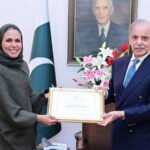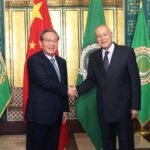Geneva, 13 March 2025
National Human Rights institutions from all regions have reported significant threats to their members and other human rights defenders.
Chairperson of Global Alliiance of National Human Rights Institutions (GANHRI) and National Human Rights Committee (NHRC) of Qatar, Mrs. MAryam bint Abdullah Al Attiyah made these remarks during the opening ceremony of the GANHRI Assembly held on Wednesday at the United Nations headquarters in Geneva.
She stated: "These institutions reported in the survey that human rights defenders and their staff have faced a wide range of violations, including arbitrary arrests, detentions, and prosecutions; harassment, intimidation, and defamation campaigns; kidnappings and threats to physical safety; restrictions on freedom of expression, particularly in online spaces; as well as budget cuts and the introduction of restrictive laws."
Al Attiyah continued, 'Additionally, these institutions reported that they themselves faced intimidation and reprisals for collaborating with the United Nations or regional human rights systems'.
She noted that the GANHRI report on reprisals includes a series of recommendations to address these threats, such as strengthening the capacity of national human rights institutions and defenders, promoting regional and international cooperation to share good practices, and forming strategic partnerships to provide local-level support for the protection of national institution members who are in urgent need.
Al Attiyah emphasized, "It is crucial, especially at this time, to establish and deepen partnerships and cooperation to support national human rights institutions. These institutions cannot effectively defend human rights unless they are strong, supported, and protected from threats to their independence—something they cannot achieve alone'.
She further explained that the Global Alliance has increased its collaboration with United Nations bodies to support the implementation of the Kyiv-Copenhagen Declaration and enhance the work of national human rights institutions in preventing and addressing torture and ill-treatment.
"This has included meetings with the Committee Against Torture and the Subcommittee on Prevention of Torture," she said.
"We also partnered with the Association for the Prevention of Torture to host a series of six-part webinars, which began last October and brought together over 100 participants from national human rights institutions worldwide." GANHRI's Chairperson added,
She stressed that it is time to continue our unwavering call for the absolute prohibition of torture, in all situations and everywhere."
On the issues of women’s rights and the rights of persons with disabilities, Al Attiyah remarked, "Although some progress has been made in many areas, thirty years after the global commitments on women's rights in Beijing, women still experience higher rates of poverty than men in most parts of the world."
"Gender-based violence, including domestic violence, remains shockingly prevalent, yet justice and redress for victims are far too inadequate, in stark contrast to the promise that 'all human beings are born free and equal.'"
She noted that GANHRI's annual conference will offer an opportunity to discuss the experiences of national human rights institutions, share good practices, and establish strong outcomes that will help guide efforts toward a better future.
Al Attiyah further stated, "Persons with disabilities continue to be among the most marginalized and excluded groups in society. Despite the adoption of the United Nations Convention on the Rights of Persons with Disabilities nearly 20 years ago, they still face deep-rooted prejudice and harmful stereotypes."
She highlighted that many national human rights institutions have prioritized work on these two critical issues: women's rights and the rights of persons with disabilities.
Al Attiyah added that national human rights institutions are often viewed as safe havens, the only places individuals can turn to for support and protection.
She concluded by saying, "The Global Alliance is committed to supporting, strengthening, and protecting national institutions so they can function effectively, in line with the Paris Principles, and contribute to global human rights advocacy efforts."
Al Attiyah also noted the devastating impact of wars and conflicts on societies, families, and individuals, effects that are hard to fully describe.
"Wars strip away rights and freedoms, as well as hope. National human rights institutions play a critical role in defending victims, monitoring and reporting violations committed against them."
She added, "In some countries, political leaders exploit the widespread anxiety and fear in communities, often caused by economic instability and rising costs of housing, healthcare, and education, to fuel internal conflicts, divide communities, and spread hatred."
"But history shows that words sowing seeds of hatred can lead to hateful and destructive actions, especially when directed against communities that lack social or political power."
Al Attiyah emphasized that, in response to these challenges, national human rights institutions are doing crucial work to combat bias, discrimination, and misinformation through evidence-based advocacy and education.
She praised the ongoing efforts of the Global Alliance's regional networks, which are creating resources to meet the needs and priorities of national human rights institutions.











